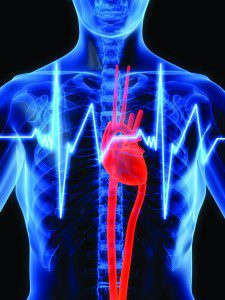We’ve all heard the dreaded names heart attack and heart failure. So what sets these two frightening conditions apart?


A heart attack, also known as a myocardial infarction, occurs when a blood clot develops at the site of plaque in a coronary artery, suddenly cutting off most or all blood supply to that part of the heart muscle. If the blood supply is not restored quickly, the heart muscle will begin to die due to lack of oxygen. This can cause permanent damage to the heart, and, in worst cases, death.
Heart attacks should not be confused with heart failure. Heart failure is typically a chronic, long-standing condition, while heart attacks generally come on suddenly.
Know the Symptoms
Symptoms of a heart attack can vary from person to person. If you think you may be having a heart attack, seek medical help and call 911 immediately.
The National Heart Attack Alert Program notes these major symptoms of a heart attack:
• Tightness and discomfort in the chest area. Most heart attacks cause pain in the center of the chest, lasting for more than a few minutes. Discomfort may subside for a minutes and then return. The sensation is an uncomfortable pressure, a feeling of swelling, fullness, or a painful squeezing.
• Pain or discomfort in other areas of the body, including one or both arms, the back, neck, jaw or stomach.
• Shortness of breath. This symptom may occur before any feeling of discomfort arises in the chest, but most often accompanies it.
• Sweating and nausea. Breaking out in a cold sweat and feeling nauseated or lightheaded are also common symptoms of a heart attack.
To improve your heart health and prevent a heart attack, maintain a healthy weight, exercise, quit smoking, eat a healthy diet, manage blood pressure and cholesterol, and visit your doctor or cardiac specialist for regular medical checkups.
Heart Failure
Heart failure (congestive heart failure) occurs when the heart fails to pump enough blood to maintain the needs of the body. A highly common condition, it affects an estimated 5 million people in the United States each year.
The best way to prevent heart failure is to manage risk factors that lead to it, such as high blood pressure, high cholesterol, coronary artery disease, obesity, and diabetes. Lifestyle changes, medication, and surgery can all relieve and improve symptoms.
Heart failure is a serious condition, but when the symptoms are managed with proper treatment, patients with heart failure can lead a normal, active life.
Getting Help
While heart failure can be less dramatic than heart attack, it can also be just as lethal. If you suspect you or a loved one may be suffering from either heart failure or a heart attack, seek medical care immediately.
This information is for educational purposes only and is not intended to replace the advice of your doctor or health care provider. We encourage you to discuss with your doctor any questions or concerns you may have.
Dr. Scala has been selected a Castle Connolly 2015 “Top Doctor” by a physician-led team of researchers in the field of Cardiovascular Disease.
South Cape Business Center
3208 Chiquita Blvd. S, Suite 110
Cape Coral, FL 33914
(239) 574-8463
www.flccg.com
Our Cardiologist
Dr. Louis J. Scala has been voted TOP DOCTOR four consecutive years by Castle Connolly. He received his medical degree at the State University of New York Health Science Center. He completed his Residency at Brown University, and Cardiology Fellowship at Cedars-Sinai Medical Center at UCLA. He is Board Certified in Internal Medicine and specializes in Cardiovascular Disease.
 Southwest Florida's Health and Wellness Magazine Health and Wellness Articles
Southwest Florida's Health and Wellness Magazine Health and Wellness Articles

